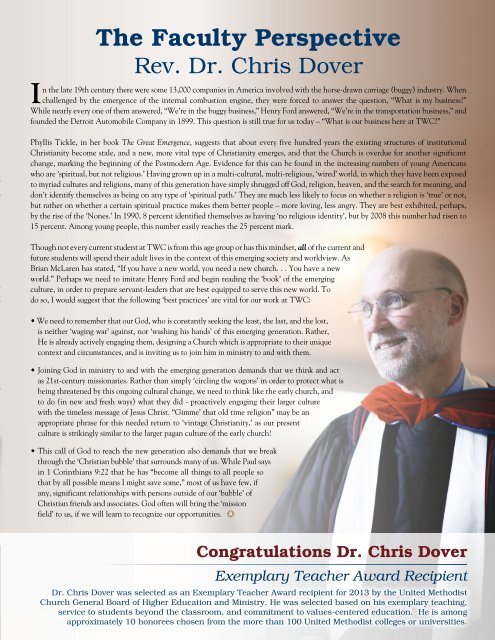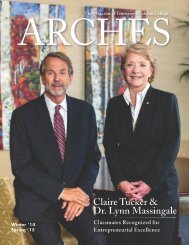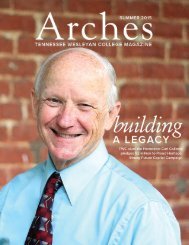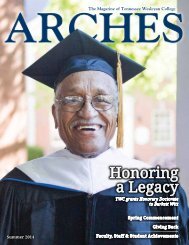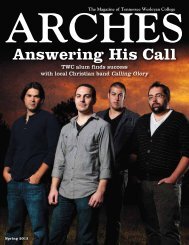TWC ARCHES Summer 2013
You also want an ePaper? Increase the reach of your titles
YUMPU automatically turns print PDFs into web optimized ePapers that Google loves.
The Faculty Perspective<br />
Rev. Dr. Chris Dover<br />
In the late 19th century there were some 13,000 companies in America involved with the horse-drawn carriage (buggy) industry. When<br />
challenged by the emergence of the internal combustion engine, they were forced to answer the question, “What is my business?”<br />
While nearly every one of them answered, “We’re in the buggy business,” Henry Ford answered, “We’re in the transportation business,” and<br />
founded the Detroit Automobile Company in 1899. This question is still true for us today – “What is our business here at <strong>TWC</strong>?”<br />
Phyllis Tickle, in her book The Great Emergence, suggests that about every five hundred years the existing structures of institutional<br />
Christianity become stale, and a new, more vital type of Christianity emerges, and that the Church is overdue for another significant<br />
change, marking the beginning of the Postmodern Age. Evidence for this can be found in the increasing numbers of young Americans<br />
who are ‘spiritual, but not religious.’ Having grown up in a multi-cultural, multi-religious, ‘wired’ world, in which they have been exposed<br />
to myriad cultures and religions, many of this generation have simply shrugged off God, religion, heaven, and the search for meaning, and<br />
don’t identify themselves as being on any type of ‘spiritual path.’ They are much less likely to focus on whether a religion is ‘true’ or not,<br />
but rather on whether a certain spiritual practice makes them better people – more loving, less angry. They are best exhibited, perhaps,<br />
by the rise of the ‘Nones.’ In 1990, 8 percent identified themselves as having ‘no religious identity’, but by 2008 this number had risen to<br />
15 percent. Among young people, this number easily reaches the 25 percent mark.<br />
Though not every current student at <strong>TWC</strong> is from this age group or has this mindset, all of the current and<br />
future students will spend their adult lives in the context of this emerging society and worldview. As<br />
Brian McLaren has stated, “If you have a new world, you need a new church. . . You have a new<br />
world.” Perhaps we need to imitate Henry Ford and begin reading the ‘book’ of the emerging<br />
culture, in order to prepare servant-leaders that are best equipped to serve this new world. To<br />
do so, I would suggest that the following ‘best practices’ are vital for our work at <strong>TWC</strong>:<br />
• We need to remember that our God, who is constantly seeking the least, the last, and the lost,<br />
is neither ‘waging war’ against, nor ‘washing his hands’ of this emerging generation. Rather,<br />
He is already actively engaging them, designing a Church which is appropriate to their unique<br />
context and circumstances, and is inviting us to join him in ministry to and with them.<br />
• Joining God in ministry to and with the emerging generation demands that we think and act<br />
as 21st-century missionaries. Rather than simply ‘circling the wagons’ in order to protect what is<br />
being threatened by this ongoing cultural change, we need to think like the early church, and<br />
to do (in new and fresh ways) what they did - proactively engaging their larger culture<br />
with the timeless message of Jesus Christ. “Gimme’ that old time religion” may be an<br />
appropriate phrase for this needed return to ‘vintage Christianity,’ as our present<br />
culture is strikingly similar to the larger pagan culture of the early church!<br />
• This call of God to reach the new generation also demands that we break<br />
through the ‘Christian bubble’ that surrounds many of us. While Paul says<br />
in 1 Corinthians 9:22 that he has “become all things to all people so<br />
that by all possible means I might save some,” most of us have few, if<br />
any, significant relationships with persons outside of our ‘bubble’ of<br />
Christian friends and associates. God often will bring the ‘mission<br />
field’ to us, if we will learn to recognize our opportunities. A<br />
Congratulations Dr. Chris Dover<br />
Exemplary Teacher Award Recipient<br />
Dr. Chris Dover was selected as an Exemplary Teacher Award recipient for <strong>2013</strong> by the United Methodist<br />
Church General Board of Higher Education and Ministry. He was selected based on his exemplary teaching,<br />
service to students beyond the classroom, and commitment to values-centered education. He is among<br />
approximately 10 honorees chosen from the more than 100 United Methodist colleges www.twcnet.edu or universities. 7<br />
7


